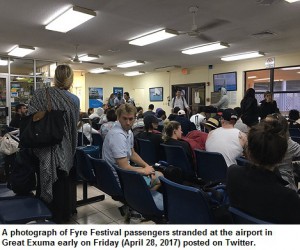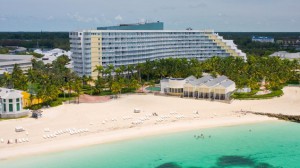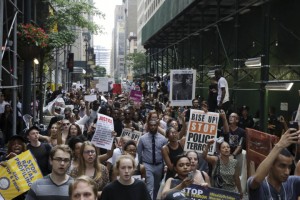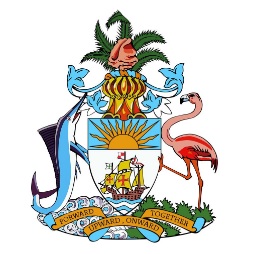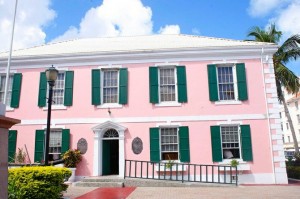Go Lean Commentary
We wish the best to the new Prime Minister of the Bahamas, Dr. Hubert A. Minnis, whose government came to power on May 10, 2017. He was thrust into power by a mandate of the Bahamian people; their demand for a change.
 But we take issue with Dr. Minnis looking to the Bahamian Diaspora as the panacea, the “cure-all” for that change; it is a flawed strategy. There is no “there” there. See the news article of his remarks to the Bahamian Diaspora in Atlanta in the Appendix below.
But we take issue with Dr. Minnis looking to the Bahamian Diaspora as the panacea, the “cure-all” for that change; it is a flawed strategy. There is no “there” there. See the news article of his remarks to the Bahamian Diaspora in Atlanta in the Appendix below.
This has been a consistent theme from the movement behind the book Go Lean … Caribbean. The criticism has been leveled against every Caribbean member-state hoping that their Diaspora – those who had fled, being “pushed” or “pulled” away from their homeland – would invest back in their country. This strategy double-downs on the failure of why the Diaspora left in the first place. A previous commentary explained:
The subtle message to the Caribbean population is that they need to leave their homeland, go get success and then please remember to invest in us afterwards.
… It is so unfortunate that the people in the Caribbean are beating down the doors to get out of their Caribbean homeland, to seek refuge in these places like the US, Canada and Western Europe. And yet it seems like the Chief Executive of this Caribbean country is encouraging more of it – there is a similar sentiment in the rest of the Caribbean member-states. As a result, we have such a sad state of affairs for our Caribbean eco-system as we are suffering from a bad record of societal abandonment.
See the Appendix VIDEO where the functionality of the Diaspora is discussed as a Caribbean standard.
The book Go Lean…Caribbean – available to download for free – serves as a roadmap for the introduction and implementation of the technocratic Caribbean Union Trade Federation (CU), for the elevation of Caribbean society – for all member-states. The book asserts that the region must work to hold on its populations – especially the professional classes – not see them leave for foreign shores. To accomplish this objective, this CU/Go Lean roadmap presents these 3 prime directives:
- Optimization of the economic engines in order to grow the regional economy to $800 Billion and create 2.2 million new jobs.
- Establishment of a security apparatus to ensure public safety and protect the resultant economic engines.
- Improvement of Caribbean governance to support these engines, including a separation-of-powers between the member-states and CU federal agencies.
The book aligns with the Prime Minister (PM) of the Bahamas in its desire to reform and transform Caribbean communities and attract more Direct Foreign Investors. While the PM’s scope is only the 320,000 population of the Bahamas, the CU/Go Lean roadmap targets all 30 member-states and their 42 million people. That different scope requires different strategies. By doing a better job of leveraging the size of the whole regional market, a lot of new solutions – size does matter – come to the fore; consider one example:
Media products would have an enlarged market size of 42 million in-country and the 20 million Diaspora.
Catering to the full size of a Caribbean Single Market is better than catering to the Diaspora of one particular country; this can reform and transform all Caribbean societal engines.
Yes, there is a panacea of Caribbean ills; but it is not the Diaspora alone; it is an interdependence of the Caribbean member-states; (including in-country populations and regional Diasporas). This was an early motivation for the CU/Go Lean roadmap, as pronounced in the opening Declaration of Interdependence (Pages 12 – 13) of the book:
xi. Whereas all men are entitled to the benefits of good governance in a free society, “new guards” must be enacted to dissuade the emergence of incompetence, corruption, nepotism and cronyism at the peril of the people’s best interest. The Federation must guarantee the executions of a social contract between government and the governed.
xix. Whereas our legacy in recent times is one of societal abandonment, it is imperative that incentives and encouragement be put in place to first dissuade the human flight, and then entice and welcome the return of our Diaspora back to our shores. This repatriation should be effected with the appropriate guards so as not to imperil the lives and securities of the repatriated citizens or the communities they inhabit. The right of repatriation is to be extended to any natural born citizens despite any previous naturalization to foreign sovereignties.
xx. Whereas the results of our decades of migration created a vibrant Diaspora in foreign lands, the Federation must organize interactions with this population into structured markets. Thus allowing foreign consumption of domestic products, services and media, which is a positive trade impact. These economic activities must not be exploited by others’ profiteering but rather harnessed by Federation resources for efficient repatriations.
xxiv. Whereas a free market economy can be induced and spurred for continuous progress, the Federation must install the controls to better manage aspects of the economy: jobs, inflation, savings rate, investments and other economic principles. Thereby attracting direct foreign investment because of the stability and vibrancy of our economy.
The Go Lean book provides 370-pages of turn-by-turn instructions on “how” to adopt new community ethos, plus the strategies, tactics, implementations and advocacies to execute so as to reboot, reform and transform the regional collective of Caribbean society.
There is a place for the Diaspora, but it must be the collective Diaspora. Economies-of-scale and regional leverage applies there too, as the total Caribbean Diaspora as been estimated at 10 to 20 million people. Why so vast a range in the count?
That is the problem with Diasporas. Their loyalty – and that of their progeny – shifts to their residential country. See how this thesis has been developed in other blog-commentaries with this sample:
| https://goleancaribbean.com/blog/?p=11420 | ‘Black British’ avoiding the Caribbean ‘Less Than’ Label |
| https://goleancaribbean.com/blog/?p=10820 | Miami: Dominican’s ‘Home Away from Home’ |
| https://goleancaribbean.com/blog/?p=10657 | Stay Home! Outreach to the Diaspora – Doubling-down on Failure |
| https://goleancaribbean.com/blog/?p=10494 | Ending the American Military Draft – Sent a ‘Welcome Sign’ |
| https://goleancaribbean.com/blog/?p=9219 | ‘Time to Go’ – When Progeny No Longer Identifies Culture |
| https://goleancaribbean.com/blog/?p=7866 | Switching Allegiances: Athletes representing other countries |
| https://goleancaribbean.com/blog/?p=2547 | Miami’s Success versus Caribbean Failure |
As related in these submissions, growing the Diaspora is bad for the Diaspora and bad for the Caribbean. The Diaspora should not be viewed as the panacea for Caribbean ills. No, the quest must be to make the homeland a better place to live, work and play so that our citizens do not leave – prosper where planted – and join the Diaspora in the first place. 🙂
Download the free e-book of Go Lean … Caribbean – now!
Sign the petition to lean-in for this roadmap for the Caribbean Union Trade Federation.
————
Appendix: Bahamian Diaspora to be mobilized, says Minnis
 ATLANTA, Georgia – Prime Minister, Dr. Hubert A. Minnis on Saturday encouraged the international Bahamian Diaspora to “consider new investment opportunities in The Bahamas” in areas ranging from tourism, to aquaculture, to the maritime sector.”
ATLANTA, Georgia – Prime Minister, Dr. Hubert A. Minnis on Saturday encouraged the international Bahamian Diaspora to “consider new investment opportunities in The Bahamas” in areas ranging from tourism, to aquaculture, to the maritime sector.”
Minnis said the Bahamian Diaspora is a “major talent and investment pool that The Bahamas must tap into”.
The prime minister said his administration intends to help create a global network of Bahamians to help boost national development and to create a 21st century Bahamas.
“I invite my fellow Bahamians overseas, those of you of Bahamian heritage, and friends of The Bahamas, to consider new investment opportunities in The Bahamas in areas ranging from tourism, to aquaculture, to the maritime sector,” Minnis said.
“The Bahamas has a highly favorable investment regime. We are cutting the red tape and too often long waiting times for international investment projects to be vetted and approved.
“Like other countries that have successfully done so, my government will cultivate and utilize the energy of the Bahamian Diaspora,” Dr. Minnis said. “Working with our foreign missions, we will create a database of Bahamians overseas who the country may tap into as potential investors and consultants.
“For example, if there is not a domestic Bahamian consultant available in a given area, the priority will be to locate a Bahamian overseas, instead of first using a non-Bahamian consultant.”
Prime Minister Minnis said his administration is also giving consideration to the establishment of an overseas council of the Bahamian Diaspora, that will utilize social media and a dedicated website to help to produce a database and platform for communication of Bahamians overseas.
The prime minister said such a council could also promote investment and job opportunities for Bahamians wishing to return to and/or work in The Bahamas.
“The council may also promote ways that Bahamians overseas can network and help with educational and community-minded projects that will benefit The Bahamas, especially young Bahamians,” Minnis said.
Addressing a cocktail reception for Bahamians living in Atlanta and “friends of the Bahamian Diaspora”, Minnis said the government of The Bahamas has undertaken a program of long-term, economic growth in order to reduce unemployment and to move the Bahamian economy onto a more sustainable path since coming to office on May 10, 2017.
Minnis told attendees that his administration is also dedicated to stabilizing public finances, reforming government and addressing official corruption.
The program of reform and transformation, Minnis said, includes new thinking about the role of government “as we create new and innovative partnerships for national development”.
Minnis also invited those in attendance to consider lending their talents and resources in areas such as youth development and community service.
“God has blessed The Bahamas with many gifts. As a people we have always been blessed with an abundance of talent way beyond our relatively small population. This includes the Bahamian Diaspora,” Minnis added.
Source: Posted and retrieved September 4, 2017 from: http://www.thenassauguardian.com/index.php?option=com_content&view=article&id=75958&Itemid=2
———–
Appendix VIDEO – CBNS101: Caribbean Diaspora – https://youtu.be/bnizsn7pdW0
Published on Apr 19, 2013 – Courtman, Sandra. Beyond the blood, the beach & the banana: new perspectives in Caribbean studies. Kingston: Ian Randle, 2004. Print.
Harney, Stefano. Nationalism and identity: culture and the imagination in a Caribbean diaspora. Kingston [Jamaica: University of the West Indies ;, 1996. Print.
Mohammed, Jennifer. Caribbean Studies: Caribbean Advanced Proficiency Examination (CAPE) : for self-study and distance learning. S.l.: [Caribbean Examinations Council (CXC)], 2004.
- Category: Education
- License: Standard YouTube License











